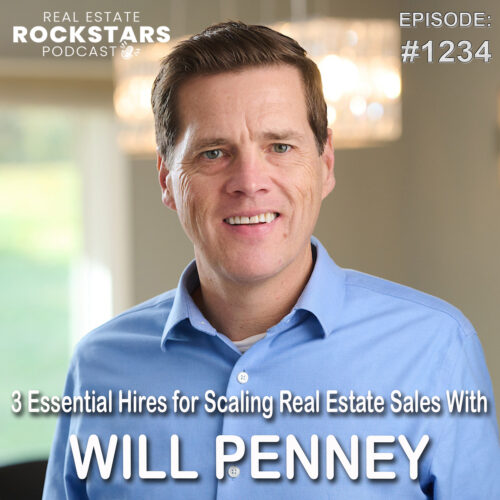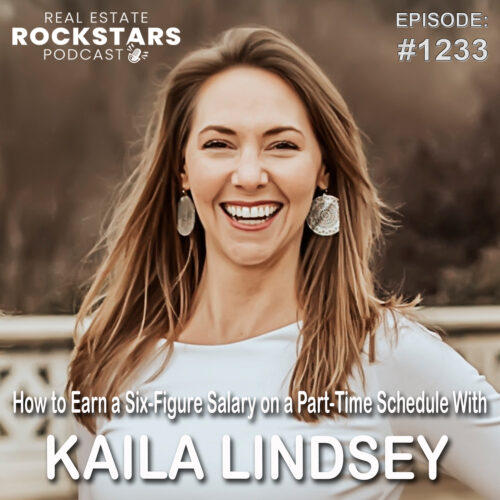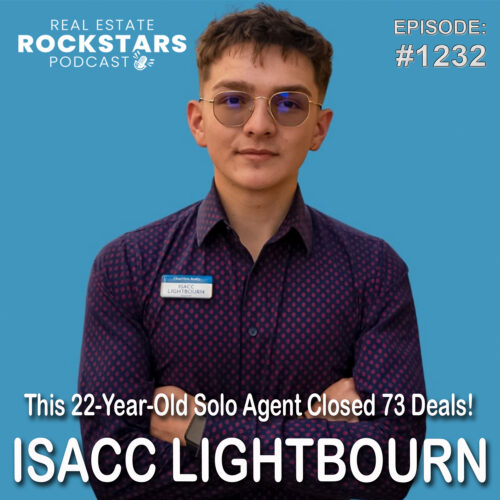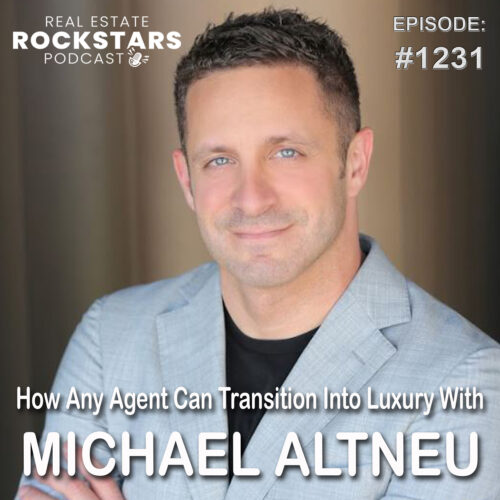- Keller Williams Family Reunion [1:28]
- KW defectors lose out on lifelong profit share [3:23]
- Jeff Bezos breaks California record for most expensive home sale [5:44]
- Failed demolition creates “Leaning Tower of Dallas” [13:27]
- Why losing agents isn’t a big deal for KW [16:08]
- Builders report best January since crash [20:41]
- Why individual investors have an advantage over large companies [25:25]
- How to break through your goals.
- Plus so much more.
- Grow Your Real Estate Profits with Our Agent Success Toolbox
- Get 6 Steps to 7 Figures by Pat Hiban for FREE
- Get Tribe of Millionaires by Pat Hiban and David Osborn for FREE
Aaron Amuchastegui: Real Estate Rockstars, this is Aaron Amuchastegui coming to you with the State of the Market number 38. It’s crazy, we just started State of the Market maybe five-six months ago but everybody loved it, so now we’ve been doing it week after week after week. Here with my good friend, Paul Morris, and today’s fun news, we get to talk about- it’s going to be really cool.
Paul and I got to hang out yesterday, some of the biggest real estate news going on right now was this last few days was Keller Williams family reunion event in Dallas. There’s so much of the news in the headlines that’s coming out of Dallas, and we’re going to be really excited to talk about it, but Paul, how was Dallas for you? Where are you, back in LA now?
Paul: Yes, back in LA. Dallas for me, because I’m part of the leadership team with Keller Williams is, it’s just a frenetic blur of a week but interesting that, when you look in the news, some of the stuff that we watched firsthand, and some of the stuff I was working on hit the news, so that’s cool.
Aaron: Yes, I had never been to the event. I went up there to go meet up with you and some other guys for the podcast, talk to a lot of prospects, find some of the best agents out there so we could get them on here to be able to share that stuff, and I was blown away with how big that event was. 19,000 agents coming into Dallas. I mean, all the big real estate companies have these big conferences like that, but, man, I was– I could not believe how many people were in there and how excited they were to talk about real estate and everything going on in the world.
Paul: Yes, it really is, and we take it straight from Gary Keller’s vision speech, which I’ve always found to be very brand-neutral. His vision speech is like an economic forecast and you can always tell where the forecasts are going to go, just say, “Hey, who do they work for?” So the NAR forecaster is going to naturally have sort of a real estate bent to it and I really think Gary goes at it and just says, “Hey, here’s the way we think the markets going and here are all the indicators,” and so interesting to to get that from sort of a brand agnostic view.
Aaron: Yes, there was– I totally agree man. So the well let’s jump on in. So, some of the– It is funny if you go to the Inman News today on the 18th, you see so much stuff, half of is regular news, half of its Keller Williams from a lot of those announcements that happened. One of the ones that stuck out to me that I actually saw all over social media today too, a lot of people are talking about this, is the big headline “Keller Williams to end the lifelong profit share program for defectors.” What’s a defector? What’s that mean? What did you– what was that announcement? Do you think it’s newsworthy?
Paul: Yes, I think it’s more clickbait than newsworthy, to be honest. First of all, just using the term defector, I don’t look–
Aaron: [laughs].
Paul: Look, I’m part of this brand, and I’ve been part of it for a long time. People go where they are going to have the best business experience. I think that’s where they should go, so if somebody leaves another firm to come to Keller Williams, I don’t think we would call him a defector. If somebody left Keller Williams to go somewhere else, I wouldn’t call him a defector.
It’s a little strong, but that’s not the real point of it. The real point of it was that making this making really they made two changes. One change was that it takes seven years to vest to become lifetime vested in the Keller Williams profit share program instead of three. So that seems like a pretty large change.
Aaron: Yes.
Paul: I think in practice, not so much, and then also this non compete rule, which is if you go out and you compete against Keller Williams, you will forfeit your your profit share. Now, interestingly, okay, because Keller Williams has already given out more than a billion dollars in profit share. Interesting is that it doesn’t affect, it’s not retroactive, so it doesn’t affect anybody, unless you join KW after April 1st. So, nobody in the profit share program even people that are have left Keller Williams competing against Keller Williams and getting big profit share, it’s not going to hurt them, so Just moving forward.
Aaron: That’s that’s an important part of that news because that does tone it down quite a bit. I think you’re right, it may be more clickbait because defector is such a strong strong word but every week we’re talking about agents moving from one you know brokerage to another and one company to another. That’s the big news that’s out there is like big offices getting transferred and then yes, the idea that it’s not retroactive and it’s just for people now moving forward. It’s also smart, it is becoming more competitive. Companies out there are– it’s like a duh, that should have been part of that a long time ago, so but maybe not huge impactful change but yes, maybe newsworthy nonetheless.
Paul: Sure.
Aaron: How about something as we jump around a little bit, I saw this I thought, I bet Paul has the inside scoop on this is, “Jeff Bezos $165 million mansion shatters Los Angeles sales record.”
Paul: Yes.
Aaron: I look at the picture over top of it. It looks like a big place but I don’t know. What makes it so special? What makes it so big in L.A or what do you know about this one?
Paul: Yes, I mean, nice house, right?
Aaron: Yes.
Paul: Yes, right. People always asked about, how’s the market or the high-end market, and I just– I totally exclude sales like this because you’re talking about, forget about the 1% or the 1% of the 1%. Forget it. You’re talking about Jeff Bezos. He is the richest man in the world. Now, this home was built in the 1930s for Jack Warner from Warner Brothers, so it started out as a movie moguls mansion, just to begin with. It was designed that way. It’s in Beverly Hills, where of course the dirt is very valuable. It’s on nine acres, so you’re talking about a giant compound right and Beverly Hills. There are not many of those, I can assure you.
Now, interesting. David Geffen, who is another industry mogul, bought it in 1990 and he paid 47 and a half million dollars for it. Pretty nice return to turn and sell for 165 million. It’s like, “I’ll retire based on that one home sale alone.” It’s a big deal. Now, one of the things that I couldn’t help myself doing because I knew you were going to ask me about this, so I I did like a little of my nerdy prep. My nerdy prep homework on this is this, Jeff Bezos spent less than one-tenth of 1% of his net worth on this home. To put that into any sort of perspective, if you’ve got $10 million net worth, that’s solid money.
Aaron: Yes.
Paul: $10 million net worth, you’d be spending 10 grand on this house.
Aaron: It’s like it’s nothing.
Paul: If have if you have $1 million in net worth, $1 million, it’s not bad, right? This is a $1,000 purchase.
Aaron: That’s why you have to throw it out, right? That’s why you can’t even count it because the guy that makes the purchase it’s like play money. It’s like fake money to him. He obviously likes the house. Do you think that because it was the Warner Brothers house that actually that just gives it a boost too? Part of me, I’m like, that’s super cool. How cool would it be to be, “I have the Warner Brothers mansion?”
Paul: Yes, well, I think the sort of pedigree and lineage of these houses does make a difference on a lower level for us normal human beings, you get like a servant A or even a B star, “Oh, hey, I’m buying some television stars house,” that’s kind of cool. We like that for sure. Yes, this is this is industry mogul house, passed on to industry mogul. I cannot imagine that David Geffen was not thinking. “hey, I’m moving into Jack Warner from Warner Brothers.” It’s got to be hitting Jeff Bezos’ radar as well.
Aaron: Yes, I think that the last thing I want to say on that– He bought it for 47 million, Geffen did, back in the 90s.
Paul: Yes.
Aaron: Now it’s been 25 years and it’s worth three times what it was, but I bet a lot of California real estate is worth three times what it was in the 90s.
Paul: That’s true.
Aaron: Even though the big 100 million dollar gain, I mean proportionally, it probably– who knows, it’d be interesting to look at and go, did it would actually appreciate more or less? Man, but yes, you can count that as a big sale. There was one guy that was going to buy that, it was a guy for him was play money, and good for him, so cool. I would want to have something like that too. What a fun little playground to play in.
Paul: Sure.
Here’s some funny news, the leaning tower of Dallas. This is so funny. I was reading this I and was like, “I wanted to ask you about it.” It says, “Texas’s newest temporary landmark, after a planned implosion,” was this this morning or yesterday? A planned implosion of the Affiliated Computer Services building in Dallas, a big part of the building remains. They tried to knock down this big old building. It didn’t knock down. A section of it came off and now looks like the Leaning Tower of Pisa in the middle of Dallas. What’s the story on that?
Paul: I think now, this might be the one State of the Market where like, “Hey, I’m in all the places.” Right?
Aaron: Yes. You’re like a world traveler.
Paul: We’re talking about the Keller Williams profit share change and I’m actually on the International Agent Leadership Council Forum. I’m a voting member. Oddly, I get three votes because I’m with three regions. I was in there, I was voting on it, I was right in the middle of that one. I wish I were a little bit more in the middle of the Bezos sale either as the agent or invitee even to the home but, hey, I’m in LA. [crosstalk] Sure enough, you’re asking me about this crazy leaning tower thing. I was like, “Whoa, wait a minute. I saw that.”
I was in a taxi cab with a taxi cab driver and the way that I noticed is he went like, “Whoa, what’s that?” Then I looked and we didn’t know what it was other than it looked like a half-blown-up building. Now, when we read the news on it, they plan these things pretty carefully and they’ve got the engineers. They want to do it safely. They want to do it completely. They detonated all the stuff they were going to do and instead of the thing coming down on an implosion like they had expected, it just fell like [animates] leaned over and half the building fell off. Now, I didn’t see that happen, I saw it after but I have one comment on that and that is, they don’t build them like they used to.
Aaron: Yes, they don’t build them like they– Absolutely, man. It says it was on Sunday so you saw it the day after it was done or maybe you saw it the day of if you saw it on Sunday too but that is crazy. I’m looking at the pictures, this giant concrete building. It is really bizarre that they literally tried to blow it up. Just did a little shift.
Yes, houses and buildings and everything used to have– There’s a lot of concrete in that thing, a lot of structure. You’d be hard-pressed to find one we build the day that wouldn’t be able to knock down. You really are the fun news that’s out there. It’s kind of funny. Last couple of things are real estate news. They contradict each other so I thought it was funny. One of the items says, “Keller Williams lost agents in the four consecutive months. Transaction volume and tech adoption are up. They lost agents.” Then, there’s another one where they were up but at family reunion, they were also announcing all these high-profile teams that are switching over.
The high-profile California team jumps from Sotheby’s to Keller Williams, The Gunderman Group. I’m sure we’re going to have them on here, soon to get interviewed on the podcast to see what’s going on. What do you think of all the news of when it’s– Do you think that people should be interested in stuff like that when all the competition between the different agents? Should that be front-line Inman news? What do you think of that news with them in particular or the losing agents but gaining good offices?
Paul: Yes, I’m telling you, I tell you upfront, I’m part of Keller Williams. I promise you solely I’m biased and that is, Keller Williams for a long time was focused so much on agent count that we tended to get a bunch of newer and inexperienced agents who turn over a lot. Now, being number one, they’re really– Gary Keller leading the charge really focused on the top, top agents.
Now, Gary was always focused on the top agents, but the shift has been in the field as well. I don’t see a loss of total agent count four months in a row as a big deal. I really don’t, especially when the volume and the sides are up. I don’t say it just because it’s a brand I’m involved with. If you’re adding really great agents and losing ones that aren’t doing any business at all or very little, it’s obviously a net gain.
Now, one of the things that’s funny is I connected with a good friend of mine, Jeff Cohen, who was the number one Berkshire Hathaway agent. [crosstalk] Hey, Jeff. I was like, “Wait a minute. Aaron already interviewed him on the podcast. Aaron scooped me. I love it.” I told Jeff that too. He was pretty quick to point out. He goes, “Aaron is one of my good buddies, too.” There you go.
Aaron: [laughs] It’s the competition of people out there as we try to get him. We are definitely committed to try to find the best people out there to provide action. It was super cool when they have 19,000 people in there. The people up on stage or people that we’ve had on the podcasts over the past few months or people scheduled to be on over the next few months.
Aaron: I knew today, you and I getting to talk to news with, especially with how closely all the inside track with all this stuff was going to be so much fun. Last piece of news that I thought was great came from Bloomberg. Bloomberg economics today, and this one hits a little bit closer to home for my background and where I came from. This says, “Home sales jump with builders recording the best January since the crash,” which is, that’s really, really phenomenal news.
Sometimes statisticians can grab this month or that month and really find it. I was a home builder. I worked for a home building company in Southern California during the boom, really at the height of the boom and then that crash. Right before the boom, it was crazy. Construction starts were going like crazy. I don’t know what percentage of our California economy was homebuilding but everybody was either building houses or being involved in the houses or owned a restaurant near these developments.
They were blowing up. The whole California economy was prepped up on all of that. Home sales being best ever since the crash means the year before the crash, January starts, that’s where we’re at now with home building starts and so in January average number of new home orders per community surged 34% to the highest level for the months since the housing recovery began.
That’s really cool. It’s really cool to see it sustain. We’ve talked about all sorts of things that probably impact that. We’ve been talking about interest rates last two weeks. We’ve been talking about supply. We’ve been talking about demand, what’s out there, nationwide home builder stuff. What have you seen out there when it comes to news with new homes and home builders?
Paul: Really, what these folks do is they look at inventory and demand, that it’s just plain and simple. They look at the cycle of how long it takes to get them ramped up. Now, one of the problems that home builders have is they have a long cycle. They have a plan, they raised some money, they buy some land. Now they’re getting entitlements, then they got to break ground and build houses. There’s a long run on it. That’s why the home builders get caught when there’s a big downdraft in the market, because, hey, they’re already committed to this process. What are they going to do now? The dirt itself, not worth nearly what they have into the process.
We’re really looking at the effect of something of decisions that were made a year ago or a certain amount of as well as I do what that lifespan is. These are decisions that are made a while ago, showing up today. Now, interesting in terms of today, we’re always looking at it’s very simple. You’ve got price and you’ve got interest rates. Those are the two factors that drive the economics of whether somebody can afford to buy a house. Very simple. The house is 300 grand and interest rates are 4%, you get a certain monthly payment. That’s how people figure out whether they can afford a house or not. It’s not that if the house was $200,000 or $150,000 but interest rates were 10%.
That’s not forget interest rates were 10%. At one point in time. Now the payment is out of reach, it doesn’t matter what the cost is. It’s really a hybrid of course, of the interest rate and the cost of the house that gives us the payment. That’s how people buy houses. As long as we see continued and we expect continued low rates through 2020, we’ll continue to see pretty healthy sales. Now, inventory is the problem. That’s what some of these new home starts are addressing.
Aaron: It is such a great point because when that crash happened and all my friends were home builders, we were home builders. I graduated in construction management and the height of the housing boom throughout all of that stuff. There is such this big cycle, household work and go buy a house, fix it and sell it or an individual investor can go buy a house, fix it and sell it. These home builders are buying vacant land, spending years on entitlements, road.
It is a great point to remember that those starts that happened in January means they were putting in roads back in July and August. They have really big economic analysis teams. A lot of them are publicly funded, huge stock companies that bring a lot of thought into different things on when to start and how to start. You can’t just say, let’s start a hundred houses. That wasn’t a decision that was made in January. That was a decision that was made six, nine months ago, sometimes two, three years ago for some of this. It’s probably that culmination of everything growing but something to definitely watch.
Paul: It’s one of the things I love for our listeners for sure is that, you look at, Oh, how am I going to compete that maybe I want to buy a house, fix it and flip it or buy a house, fix it and hold it. Really, how do I compete with these giant REITs that have huge analysts teams and all this money behind and that sort of thing? My answer to that is we’re nimble so that you and I, we can decide tomorrow to buy a house. We could go ahead and buy it within the next week, we can make decisions very quickly that the big players can’t do.
Warren Buffet, I’ll butcher the quote a little bit but he’s like, “Oh, you think it’s hard to invest your hundred grand or whatever, try figure out how to invest a billion dollars,” because it’s a different world but then again finding out how to place that giant amount of money, we have several hundred million dollars to deploy, you and I can make a much better faster decision on one house than they can on a whole track of hundreds and thousands of houses.
Aaron: It’s like, stay nimble, stay local, focus what you know, like nobody knows what’s happening on my street as much as I do. Nobody knows what’s happening in your neighborhood as much as you do. As you find that niche, that’s one thing that home builders on a massive scale, they look at stuff on a massive scale and a zip code basis and other things but the boat, when it comes down to that really micro level, they can’t get there.
That was a fun State of the Market, man. I was pumped all day, knowing the stuff that we’d be talking about out here. We’ll be back. You’ve got a lot of fun interviews coming up with people. I’ve got a lot of fun interviews coming up with people as we get on there. Listeners, if you guys are loving the state of the market shows, if you’re loving it or hating it, go give us some reviews, let us know what you think of the state of the market.
Again, if there’s real estate news out there that we know about, if you see it or that about and we should be sharing with everybody. If you see it, send it over to us, we’re trying to find the best stuff that we think is actionable news for you guys. If we’re missing some tell us, let’s make it better.
Paul: I love it. Why don’t you tell them where they can send those inquiries and we’ll end it up there.
Aaron: Absolutely. We go to hibandigital.com, H-I-B-A-N digital.com. You’ll be able to add a comment on there, go to our RE rockstars on Instagram. We follow that. We check out those messages or you can find Paul or I on Instagram. Aaron, Amuchastegui with an a and Paul Morris. Paul, what’s your Instagram
Paul: Paul Mark, P-A-U-L, Mark, M-A-R-K, Morris, and that’s my Instagram handle and also Facebook. I check that stuff, so drop me a message and we’ll take your feedback, love it we always want to do better. Also, if you got some questions that we can handle on this podcast, we’d love to do that.
Aaron: Yes, we would love to, and it really is. I check this stuff too. I can’t check my email, I get hundreds and hundreds of emails a day from spammers. I’m way more likely to be able to talk to somebody on Instagram or Facebook to actually see out there. Reach out to us, we want to keep making great shows for you guys out there, Real Estate Rockstar Radio, State of The Market. Paul, thanks for coming on joining me
Paul: All right, man. Thanks. I really enjoyed it. We have fun doing this.
Aaron: That was fun.





